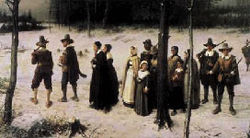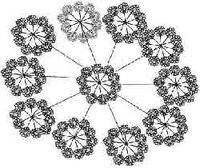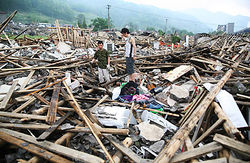Intentional community: Difference between revisions
No edit summary |
|||
| Line 1: | Line 1: | ||
[[Image:pilgrims.jpg|250px|right|thumb|The spiritual intent of individuals collectively determines the [[Sense of Community|sense of the community]] which defines [[Community Ethics]] and [[Community Law]] which in turn will establish different [[Community Types]] and the nature of an [[Intentional Community]].]] | [[Image:pilgrims.jpg|250px|right|thumb|The spiritual intent of individuals collectively determines the [[Sense of Community|sense of the community]] which defines [[Community Ethics]] and [[Community Law]] which in turn will establish different [[Community Types]] and the nature of an [[Intentional Community]] and its fate.]] | ||
== Defined communities == | == Defined communities == | ||
| Line 11: | Line 11: | ||
The members of an ''intentional community'' often ''hold common values'' which involve a ''social, political, religious, or spiritual vision''. They will often follow ''lifestyle with particular goals or purposes'' in mind. They typically ''share some responsibilities and resources''. | The members of an ''intentional community'' often ''hold common values'' which involve a ''social, political, religious, or spiritual vision''. They will often follow ''lifestyle with particular goals or purposes'' in mind. They typically ''share some responsibilities and resources''. | ||
Intentional communities include collective households, [[cohousing]] communities, ecovillages, communes, survivalist retreats, religious orders, kibbutzim, ashrams, and housing cooperatives. In truth all forms of government are in essence part of intentional communities but could also include what Christ called a ''[[polis|city on a hill]]''. The more a community is dependent upon the government of the nation or nations in which it is formed the more its nature will be influenced by those national governments. | Intentional communities include collective households, [[cohousing]] communities, ecovillages, communes, survivalist retreats, religious orders, kibbutzim, ashrams, and housing cooperatives. In truth, all forms of government are in essence part of intentional communities. | ||
When someone tells me they want to form an intentional community the first questions need to be asked to determine more about what is their intent. Stalin and Mao were the authors of intentional communities and so was Hitler, [[Nimrod]], [[Cain]] and [[Caesar]] but such lists could also include what Christ called a ''[[polis|city on a hill]]''. | |||
The far-reaching consequences of basic forms used to establish an intentional community will determine the fate of that community as much as individual intent. The more a community is dependent upon the government of the nation or nations in which it is formed the more its nature will be influenced by those national governments. | |||
== Ancient communities == | == Ancient communities == | ||
| Line 34: | Line 38: | ||
[http://www.hisholychurch.net/audio/171021-ICS.mp3 Audio on ICS and ISS].]] | [http://www.hisholychurch.net/audio/171021-ICS.mp3 Audio on ICS and ISS].]] | ||
< | <html><audio controls src="http://www.hisholychurch.net/audio/171021-ICS.mp3"></audio></html> | ||
Revision as of 08:47, 16 June 2018

Defined communities
- An intentional community is a planned community which is often residentially designed from the beginning to have a high degree of social cohesion through a common interaction.
- Part of that deffinition is the word community. A community by definition is the result of sharing[1] and by nature would maintain a mutual communion within society in both an ethical and physical system of interaction.
The members of an intentional community often hold common values which involve a social, political, religious, or spiritual vision. They will often follow lifestyle with particular goals or purposes in mind. They typically share some responsibilities and resources.
Intentional communities include collective households, cohousing communities, ecovillages, communes, survivalist retreats, religious orders, kibbutzim, ashrams, and housing cooperatives. In truth, all forms of government are in essence part of intentional communities.
When someone tells me they want to form an intentional community the first questions need to be asked to determine more about what is their intent. Stalin and Mao were the authors of intentional communities and so was Hitler, Nimrod, Cain and Caesar but such lists could also include what Christ called a city on a hill.
The far-reaching consequences of basic forms used to establish an intentional community will determine the fate of that community as much as individual intent. The more a community is dependent upon the government of the nation or nations in which it is formed the more its nature will be influenced by those national governments.
Ancient communities

Most ancient civilizations evolved from intentional communities. The foundational values that are held by a community will dictate the growth or decay of a society.
The Greek word for "city" is "Polis" which did not mean a city as we often think of the term in modern society. The Greek city states evolved into a number of different societies and as they shifted values they also shifted the nature of their society. The shift created new problems or dynamics which cause values to shift again. Societies may change over time from generation to generation until the society fails.
What are the essential parameters of a free and prosperous society?
Rome, the Teutons, and ancient Israel all began with specific sets of values or Social Virtues. All shifted those values based properties of their community, this shift changed society, changing the moral character of the people within the society, and then another shift in values occurred producing even more changes.
Each of these societies created foundational structures which set the moral character of society. From the 12 Tablets of Rome to the Ten Commandments of Israel those basic outlines of acceptable elements of society set the boundaries of those free societies. While the desire for personal liberty is important, whether escaping from the tyranny of Tarquinian kings or the Corvee despotism of the Pharaohs of Egypt, far more important is the pervasive and cultivated desire to sustain the freedom and rights of your neighbor.
In other words the golden rule of caring about your neighbor as much as yourself is an essential element of a free society. What rituals and ceremonies within society might foster and enhance that element within the hearts of the people?
Repeated Values

The repetition of common values cause a repeat in patterns within nature called Fractal Networks. Incident Command Systems (ICS) used by FEMA repeat the spirit of their creator. The Tens used by voluntary societies of free people may produce a different if not better results. Understanding these foundational values, guidelines, and limits in their many forms and comprehending where straying from them brings social change, and even degeneration, is not only important but essential in a sustainable and Intentional Community that wishes to be free.

It is inherent in the nature of man to desire relationships within society that promotes a “Sense of Community” of belonging, a feeling that you matter to others within your group or tribe. This Sense of Community comes from practices that confirm a mutual commitment which encourages respect, honor and compassion.
The rituals or practices and ceremonies of an intentional community should establish, nurture, and affirm that sense of community from generation to generation. That sense of community must run deep within the heart and mind of individuals to sustain loyalty during the extremes of societal hardships.
James Scott has looked at such remote societies that chose to be free rather than being comfortable or pursuing the promised comfort of an organized state. Abraham departed the city State of Ur to form an Intentional Community and did so with his Altars of Living stones. Moses left the state of Egypt to form a free state with no exercising authority from the top down where every-man was king in his own home. Christ started an Intentional Community when he appointed a kingdom to His Apostles where there were no Benefactors who could exercise authority since the people lived by faith, hope and charity and the perfect law of liberty with Lively Stones forming living Altars of social welfare.

The Christian conflict was also mostly about not participating in the state religion which consisted of the covetous practice of state sponsored Corban which is so popular with Modern Christians.
One of the natural governing agents of society is the purpose for gathering to support the wellbeing of the people using the Charitable Practices of a voluntary system of Daily ministration.
The purposes of intentional communities vary. They may include sharing limited resources, creating physical or financial safety, and a more spiritual and emotional commonality.
The way in which you do this and the bands that society depends upon to hold it together will determine the nature of society and the people within it.
Successful intentional communities
Someone said there are many successful intentional communities and gave two examples like the Twelve Tribes and Avalon Gardens.
We have addressed some of the problems with the Twelve Tribes but a number of questions may need to be asked about an intentional community.
What is a successful intentional community?
And why do we need a network?
Soviet Union could be considered an intentional community and so could ancient Israel and the early Church.
A number of questions could be considered to determine what a successful intentional community is or is not.
- What is the visible goals of the community?
- Do the leaders have power over other members of the community?
- If so, what are the true goals or motivations of the leaders?
- To determine if a group is a successful intentional community we may need to define successful, and what is your point of view of successful?
- "Successful for or to whom?"
- What are your goals?
- When we say community are we talking a commune or common purse?
If your goal is to make your life easier, to free yourself, or any other selfish reason, then you will be planting a selfish spirit in your community. Your goals would then be listed as selfish reasons.
If the reason you gather in your community was to free others, strengthen others, and prosper others, then the success of your community will look much different than the communities that come together simply to make their own life easier.
The early Christian community was doing things much different than what the Modern Christians are doing. In fact, they were doing what in many cases would be considered the exact opposite.
The question was asked "If a true christian is in need, and prays for benefits at the Table of the Lord, should not the Lord respond...? Would the Good Lord rather have him pray to Caesar...?"
A second question could be asked. "What is a 'true christian'?"
How do you know who is a Christian and who is not?
It would be someone who is not just saying they believe in Jesus but someone who is actually a Doer of the word. A Christian would be someone who actually was following in The Way of Christ. Of course, there might be people out in the World that could use help in the form of benefits of blessings, even though they are not a part of the Christian Church established by Christ and we certainly could help them.
In 2 Timothy 3:5 we see "Having a form of godliness, but denying the power thereof: from such turn away." Paul was talking about men who were lovers of their own selves, covetous. This of course would include people who desire benefits at the expense of their neighbor or even lack a certain amount of personal charity. He goes on to include boasters, proud, blasphemers, disobedient to parents which in these times and in ancient Rome would include the Conscripted fathers of the state. That, of course, is why Jesus said to give to Caesar what was Caesar's and be friends with the unrighteous Mammon, so that you would be fit for more righteous habitations.
He also included, among those men we were to turn away, those who were "unthankful". That word is from the Greek word acharistos [2] which was a derivative of a word charizomai [3] meaning forgive. A socialist state does not encourage gratefulness. In fact, the more entitlements within a society, then members of the community become less grateful. The word grateful and the word grace are both derived from the common Latin word gratus, from which we obtain the word gratitude. Grace, forgiveness, gratitude all have common natures. We know that Jesus says that if you do not forgive, neither would you be forgiven. We should be able to assume that if you do not give, neither would you be given. If you were slothful and pursued entitlements rather than sacrifice in love, then where is grace?
Paul lists other characteristics and practices to notify us on the topic of identifying from whom to turn away. Those he calls "unholy, Without natural affection, trucebreakers, false accusers, incontinent, fierce, despisers of those that are good, Traitors, heady, highminded, lovers of pleasures more than lovers of God;[4]
Individuals of a successful community will seek social virtues and oppose the vices which erode society:
- They will not put heavy burdens upon one another.
- They will not curse their children with debt through Covetous Practices.
- They will not make themselves merchandise or surety for debt.
- They will not pray to men who call themselves benefactors but actually only offer what they take from others.
- They will not take a bite out of one another nor do anything to take from their neighbor.
- They will not seek to have one purse in a socialist state.
- They will try to gather together to procure the blessings of freedom for others as much as themselves.
- They will give daily out of love and thanksgiving in grace.
- They will forgive daily so that they may be forgiven.
- They will share what they have with all who seek to gather in a network bound by Fervent Charity.
- They will diligently seek those who may be lost in the bondage of the world.
- They will seek to set the captive free with their whole heart, mind and soul.
- They will lay down their life daily with faith that they will have life more abundant in this life or the life to come.
- They will follow Christ and The Way.
Approaches
Over the history of mankind, intentional communities have followed numerous criteria in the acceptance of new members. There were often certain qualifications or trials to face. Certain patterns of behavior were either required, or members could be shunned or cast out of the community. Participation in certain activities were often required.
New members of an intentional community are often selected by the community's existing membership, the leaders, or a board, rather than by real-estate agents or land owners, especially if the land is owned collectively by the community. If we look at intentional communities of the past, we can learn from their successes and failures what are the best methods for keeping these communities viable and healthy?
What is the criteria of a healthy and viable community that gives life? You may seek an individual community or a community of individuals. In Africa, the community is often more important than the individual. This approach can lead to tribal dispute and warfare. The Christian community was composed of individuals who were seeking to think and act like Christ according to the righteousness of God, and this leads to life.
A community of individuals express or manifest a common character of their heart and mind. Those common activities of a community could be called "rituals and ceremonies". Both the early Christian and Israelite communities had "rituals and ceremonies", but so did the Pharisees and many other communities.
The "rituals and ceremonies" of a society often have a meaning and purpose that is intended to communicate, and they set a pattern for the mind of society composed of individuals. These "rituals and ceremonies" become the symbols of a national society. But “When a symbol unmoors itself from what it symbolizes, it loses meaning. It becomes ineffective.” - Albert Einstein
The individuals who are motivated out of a love of God of Creation and The Way of Christ do not seek a community to get help or support, but they seek to come together so that they may support and strengthen others. To form a free society, every individual must seek personal independence so as not to be dependent upon society or to be a burden to it.
A ritual is defined as "the prescribed order of performing a ceremony, especially one characteristic of a particular religion or church." The Church legally defined in its most general sense was the religious society founded and established by Jesus Christ, to receive, preserve, and propagate His doctrines and ordinances.
There are two aspects of the rituals of Christ: service and sacrifice in charity and love. Those doctrines and ordinances of Christ included to love one another, which requires daily sacrifice through charity. You would not want to gather with people who were not putting charity before personal comfort.
The ritual sacrifice of the resources of the individual in the service of others are the essence of rituals of the Christian community as acts of worship. Without a Daily ministration through charitable system of living altars, there would be little reason to uproot oneself and gather with people who claim to desire a community.
If people will not form a voluntary network that is as concerned with the healing and caring for the sick or injured of their society, and even people in general, then they may not be the people you would want in your community. The consistent manifestation of "Social Virtues" in the formation of an independent network of charity should be a primary requirement for forming a sustainable community.
Such a network requires perseverance and consistency in voluntary sacrifice, not just teaching the truth; distributing knowledge; cleansing the soul, body, and minds of the congregation of social vices like envy, hate, ignorance, apathy, avarice...
The ritual of Baptism was not just a mindless ritual, but it was ceremony which marked a change in the way that you provided the social welfare of the people. It was moving from a spirit of force to a spirit of voluntary sacrifice on a daily basis.
The ritual of the breaking of bread was a symbol of a mutual Distribution of Charity that brought a unification of the brotherhood of man into one accord through arbitration and a holy kiss of love and patience with the nature of Jesus Christ and the Holy Spirit. The result is assisting in the daily administration of the needy in a community, including the fatherless and homeless.
The ceremonies of the community are also a part of the services of that society and are often symbolical as prescribed by natural law, custom, or authority over oneself and your family established by a lineal consanguinity. Feasts and festivals were times where forgiveness was paramount. Disagreement and offenses of the past were forgiven and forgotten.
The ceremonies guide the members of the body to recognize in the outward conduct concerning important matters in the performance of duties to God and their fellowman.
- Romans 12:2 "And be not conformed to this world: but be ye transformed by the renewing of your mind, that ye may prove what [is] that good, and acceptable, and perfect, will of God."
This idea of intentional communities is a major topic of the Network.
In the formation of a community, a great deal of consideration should be given to Community Ethics and Community Law, as well as the distinctions between Society and community.
In its widest sense, society is "the people in general..." [5], but community is the result of communion of the people as an unction within society.
Community |
Intentional Community |
Sense of Community |
Community Types |
Community Ethics |
Community Law |
Voluntary society |
Voluntaryist Constitution |
Volunteer |
Society |
Individualism |
Liberalism |
Classical liberalism |
Transcendentalist |
Communities Ancient |
Communitarian |
Collectivism |
Identity politics |
Socialism |
Communism |
Primitive Communism |
Communion |
Eucharist |
Social Virtues |
Daily ministration |
Tens |
FEMA |
Burning Bush Festival |
Burning Bush Festival |
Feasts |
Feasts and festivals |
Pentecost |
Celebrate |
Law |
Rights |
Economy |
Education |
Welfare types |
Stimulus |
Building back |
The Greatest Reset |
Agorism |
Permaculture |
Guru theories |
Perfect law of liberty |
Benefactors |
Covetous practices |
Christian conflict |
Pure Religion |
Public religion |
Imperial Cult of Rome |
gods |
Covet |
First to do List |
Fundamental orders |
Network |
Law
Law |
Natural Law |
Legal title |
Common Law |
Fiction of law |
Stare decisis |
Jury |
Voir dire |
Consent |
Contract |
Parental contract |
Government |
Civil law |
Civil Rights |
Civil Government |
Governments |
No Kings |
Canon law |
Cities of refuge |
Levites |
Citizen |
Equity |
The Ten Laws |
Law of the Maat |
Bastiat's The Law and Two Trees |
Trees |
The Occupy Refuge Movement |
Clive Bundy |
Hammond |
Barcroft |
Benefactors |
Gods |
Jury |
Sanhedrin |
Protection |
Weightier matters |
Social contract |
Community Law |
Perfect law of liberty |
Power to change |
Covet |
Rights |
Anarchist |
Agorism |
Live as if the state does not exist |
Rights |
Property rights |
Human Rights |
Human Events |
Law |
Natural Law |
Civil law |
Legal |
Common Law |
Fiction of law |
UNIVERSAL DECLARATION OF HUMAN RIGHTS |
Parents have a prior right |
Universal Declaration on Bioethics and Human Rights |
Human resources |
Merchandise |
Employ |
Universal Service |
Tribute |
Corvee |
The Way |
Foolishly |
Foolish virgins |
The Right of Self-determination |
Fraud |
Free Assemblies |
CORE |
Righteousness |
Workers of Iniquity |
Doers of the Word |
Fruit |
Newsletter |
Dear Network |
Network Notes |
The Kingdom Newsletter |
Thought for the day |
Events List |
Free speech |
Conversation
==Footnotes==
- ↑ a group of people living in the same place or having a particular characteristic in common.
- a feeling of fellowship with others, as a result of sharing common attitudes, interests, and goals.
- ↑ 884 ~ἀχάριστος~ acharistos \@ach-ar’-is-tos\@ from 1 (as a negative particle) and a presumed derivative of 5483; adj AV-unthankful 2; 2
- 1) ungracious
- 1a) unpleasing
- 1b) unthankful
- 1) ungracious
- ↑ 5483 ~χαρίζομαι~ charizomai \@khar-id’-zom-ahee\@ middle voice from 5485; v AV-forgive 11, give 6, freely give 2, deliver 2, grant 1, frankly forgive 1; 23
- 1) to do something pleasant or agreeable (to one), to do a favour to,
- 1a) to show one’s self gracious, kind, benevolent
- 1b) to grant forgiveness, to pardon
- 1c) to give graciously, give freely, bestow
- 1c1) to forgive
- 1c2) graciously to restore one to another
- 1c3) to preserve for one a person in peril
- ↑ 2 Timothy 3:2 For men shall be lovers of their own selves, covetous, boasters, proud, blasphemers, disobedient to parents, unthankful, unholy, Without natural affection, trucebreakers, false accusers, incontinent, fierce, despisers of those that are good, 4 Traitors, heady, highminded, lovers of pleasures more than lovers of God;
- ↑ "Society. An association or company of persons (generally unincorporated) united together by mutual consent, in order to deliberate, determine, and act jointly for some common purpose." "In a wider sense, the community or public; the people in general..." Black's Law dictionary 5th Edition